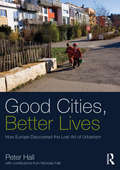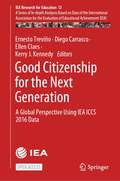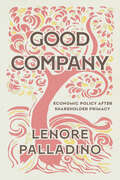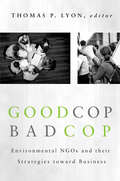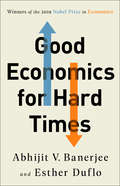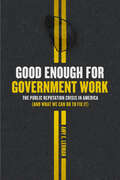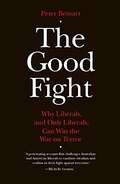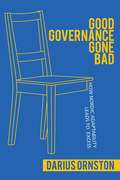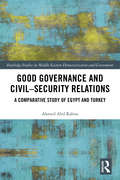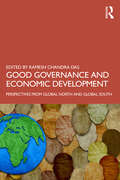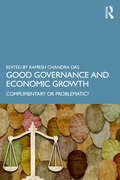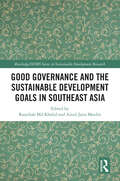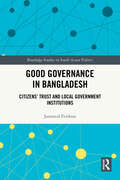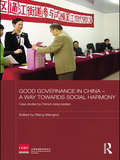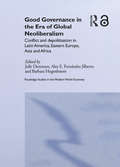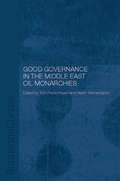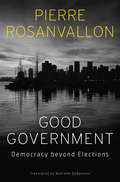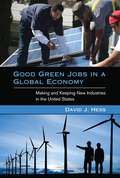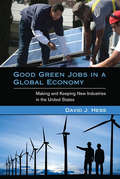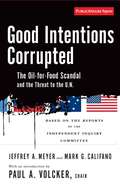- Table View
- List View
Good Cities, Better Lives: How Europe Discovered the Lost Art of Urbanism (Planning, History and Environment Series)
by Peter HallThis book has one central theme: how, in the United Kingdom, can we create better cities and towns in which to live and work and play? What can we learn from other countries, especially our near neighbours in Europe? And, in turn, can we provide lessons for other countries facing similar dilemmas? Urban Britain is not functioning as it should. Social inequalities and regional disparities show little sign of going away. Efforts to generate growth, and spread it to the poorer areas of cities, have failed dismally. Much new urban development and redevelopment is not up to standard. Yet there are cities in mainland Europe, which have set new standards of high-quality sustainable urban development. This book looks at these best-practice examples – in Germany, the Netherlands, France and Scandinavia, – and suggests ways in which the UK and other countries could do the same. The book is in three parts. Part 1 analyses the main issues for urban planning and development – in economic development and job generation, sustainable development, housing policy, transport and development mechanisms – and probes how practice in the UK has fallen short. Part Two embarks on a tour of best-practice cities in Europe, starting in Germany with the country’s boosting of its cities’ economies, moving to the spectacularly successful new housing developments in the Netherlands, from there to France’s integrated city transport, then to Scandinavia’s pursuit of sustainability for its cities, and finally back to Germany, to Freiburg – the city that ‘did it all’. Part Three sums up the lessons of Part Two and sets out the key steps needed to launch a new wave of urban development and regeneration on a radically different basis.
Good Citizenship for the Next Generation: A Global Perspective Using IEA ICCS 2016 Data (IEA Research for Education #12)
by Kerry J. Kennedy Ernesto Treviño Diego Carrasco Ellen ClaesThis Open Access book presents an international group of scholars seeking to understand how youth from different cultures relate to modern multidimensional concepts of citizenship, and the roles that education and society have in shaping the views of the world’s future citizens. The book also explores how different aspects of citizenship, such as attitudes towards diverse population groups and concerns for social issues, relate to classical definitions of norm-based citizenship from the political sciences. Authors from Asia, Europe, and Latin America provide a series of in-depth investigations into how concepts of “good citizenship” are shaped in different regions of the globe, using the rich comparative data from the IEA’s International Civic and Citizenship Study (ICCS) 2016. In twelve chapters, the authors review the concept of “good citizenship”; how citizenship norms adherence is configured into profiles across countries; and what country, school, and background factors are related to how students adhere to citizenship norms. Recognizing contingent social and political situations in specific regions of the world, the present books offer six chapters where authors apply their expertise to offer locally relevant and pertinent observations on how young people from diverse cultures understand and relate to different dimensions of citizenship in countries of Asia, Europe, and Latin America. The present book is of relevance for different audiences interested in civic education and political socialization, including social sciences and education, integrating topics from political science, sociology, political psychology, and law.
Good Company: Economic Policy after Shareholder Primacy
by Lenore PalladinoOn the faulty intellectual origins of shareholder primacy—and how policy can win back what’s been lost. In an era of shareholder primacy, share price is king. Businesses operate with short-term goals to deliver profits to shareholders, enjoying stability (and bonuses) in the process. While the public bemoans the doctrine for its insularity and wealth-consolidating effects, its influence over corporate governance persists. Good Company offers an exacting argument for why shareholder primacy was never the right model to follow for truly understanding how corporations operate. Lenore Palladino shows that corporations draw power from public charters—agreements that allow corporations to enjoy all manner of operational benefits. In return, companies are meant to innovate for the betterment of the societies that support them. However, that debt—increasingly wielded for stock buybacks and shareholder bonuses—is not being repaid. Palladino theorizes a modern corporation that plays its intended role while delivering social and economic good in the process and offers tangible policy solutions to make this a reality. Good Company is both an expert introduction to the political economy of the firm—as it was, as it is, as it can be—and a calibrating examination of how public policy can shape companies, and societies, for the better.
Good Cop/Bad Cop: Environmental NGOs and Their Strategies toward Business
by Thomas LyonNon-governmental organizations (NGOs) play an increasingly prominent role in addressing complex environmental issues such as climate change, persistent bio-accumulative pollutants, and the conservation of biodiversity. At the same time, the landscape in which they operate is changing rapidly. Markets, and direct engagement with industry, rather than traditional government regulation, are often the tools of choice for NGOs seeking to change corporate behavior today. Yet these new strategies are poorly understood-by business, academics, and NGOs themselves. How will NGOs choose which battles to fight, differentiate themselves from one another in order to attract membership and funding, and decide when to form alliances and when to work separately? In Good Cop/Bad Cop, Thomas P. Lyon brings together perspectives on environmental NGOs from leading social scientists, as well as leaders from within the NGO and corporate worlds, to assess the state of knowledge on the tactics and the effectiveness of environmental groups. Contributions from Greenpeace, Rainforest Action Network, the Environmental Defense Fund, and the World Wildlife Fund describe each organization?s structure and key objectives, and present case studies that illustrate how each organization makes a difference, especially with regard to its strategies toward corporate engagement. To provide additional perspective, high-level executives from BP and Ford share their views on what causes these relationships between companies and NGOs to either succeed or fail. For students of the social sciences and NGO practitioners, this book takes an important step in addressing an urgent need for objective study of NGO operations and their effectiveness.
Good Day!
by Paul Batura"Hello Americans, I'm Paul Harvey."He was the voice of an era. Millions grew up listening to Paul Harvey News and Comment and The Rest of the Story, and trusted the great man who spoke for the little guy.Good Day! by Paul J. Batura follows the remarkable life of one of the founding fathers of the news media. Paul Harvey started his career during the Great Depression and narrated America's story day by day, through wars and peace, the threat of communism and the crumbling of old colonial powers, consumer booms and eventual busts. In Good Day!, you'll follow,* How he became "Paul Harvey"* The remarkable adversity he confronted in his early years* How he revolutionized the radio industry with his wife, Evelyn* How a president wanted to "roast" him "good"* How he was nearly jailed for pursuing a scoopPaul J. Batura's Good Day! is a colorful biography of the radio pioneer-turned-legend whose guiding light saw the country through dark times. Whether he was covering racial tensions, terrorist attacks, or which vitamins to take, Paul Harvey articulated the American experience for average people making their way in a world too large for quick comprehension. Harvey brought them that world "in dime store words," with a sense of optimism and faith, and with a deep love for America. Here is Harvey's story, the rest of the story, as he would tell it himself.
Good Economics for Hard Times: Six Ways We Get The World Wrong And How To Set It Right
by Esther Duflo Abhijit V. BanerjeeThe winners of the Nobel Prize show how economics, when done right, can help us solve the thorniest social and political problems of our day.Figuring out how to deal with today's critical economic problems is perhaps the great challenge of our time. Much greater than space travel or perhaps even the next revolutionary medical breakthrough, what is at stake is the whole idea of the good life as we have known it.Immigration and inequality, globalization and technological disruption, slowing growth and accelerating climate change--these are sources of great anxiety across the world, from New Delhi and Dakar to Paris and Washington, DC. The resources to address these challenges are there--what we lack are ideas that will help us jump the wall of disagreement and distrust that divides us. If we succeed, history will remember our era with gratitude; if we fail, the potential losses are incalculable.In this revolutionary book, renowned MIT economists Abhijit V. Banerjee and Esther Duflo take on this challenge, building on cutting-edge research in economics explained with lucidity and grace. Original, provocative, and urgent, Good Economics for Hard Times makes a persuasive case for an intelligent interventionism and a society built on compassion and respect. It is an extraordinary achievement, one that shines a light to help us appreciate and understand our precariously balanced world.
Good Enough for Government Work: The Public Reputation Crisis in America (And What We Can Do to Fix It) (Chicago Studies in American Politics)
by Amy E. LermanAmerican government is in the midst of a reputation crisis. An overwhelming majority of citizens—Republicans and Democrats alike—hold negative perceptions of the government and believe it is wasteful, inefficient, and doing a generally poor job managing public programs and providing public services. When social problems arise, Americans are therefore skeptical that the government has the ability to respond effectively. It’s a serious problem, argues Amy E. Lerman, and it will not be a simple one to fix. With Good Enough for Government Work, Lerman uses surveys, experiments, and public opinion data to argue persuasively that the reputation of government is itself an impediment to government’s ability to achieve the common good. In addition to improving its efficiency and effectiveness, government therefore has an equally critical task: countering the belief that the public sector is mired in incompetence. Lerman takes readers through the main challenges. Negative perceptions are highly resistant to change, she shows, because we tend to perceive the world in a way that confirms our negative stereotypes of government—even in the face of new information. Those who hold particularly negative perceptions also begin to “opt out” in favor of private alternatives, such as sending their children to private schools, living in gated communities, and refusing to participate in public health insurance programs. When sufficient numbers of people opt out of public services, the result can be a decline in the objective quality of public provision. In this way, citizens’ beliefs about government can quickly become a self-fulfilling prophecy, with consequences for all. Lerman concludes with practical solutions for how the government might improve its reputation and roll back current efforts to eliminate or privatize even some of the most critical public services.
Good Fences, Bad Neighbors
by Boaz AtziliBorder fixity--the proscription of foreign conquest and the annexation of homeland territory--has, since World War II, become a powerful norm in world politics. This development has been said to increase stability and peace in international relations. Yet, in a world in which it is unacceptable to challenge international borders by force, sociopolitically weak states remain a significant source of widespread conflict, war, and instability. In this book, Boaz Atzili argues that the process of state building has long been influenced by external territorial pressures and competition, with the absence of border fixity contributing to the evolution of strong states--and its presence to the survival of weak ones. What results from this norm, he argues, are conditions that make internal conflict and the spillover of interstate war more likely. Using a comparison of historical and contemporary case studies, Atzili sheds light on the relationship between state weakness and conflict. His argument that under some circumstances an international norm that was established to preserve the peace may actually create conditions that are ripe for war is sure to generate debate and shed light on the dynamics of continuing conflict in the twenty-first century.
Good Fences, Bad Neighbors: Border Fixity and International Conflict
by Boaz AtziliBorder fixity—the proscription of foreign conquest and the annexation of homeland territory—has, since World War II, become a powerful norm in world politics. This development has been said to increase stability and peace in international relations. Yet, in a world in which it is unacceptable to challenge international borders by force, sociopolitically weak states remain a significant source of widespread conflict, war, and instability.In this book, Boaz Atzili argues that the process of state building has long been influenced by external territorial pressures and competition, with the absence of border fixity contributing to the evolution of strong states—and its presence to the survival of weak ones. What results from this norm, he argues, are conditions that make internal conflict and the spillover of interstate war more likely. Using a comparison of historical and contemporary case studies, Atzili sheds light on the relationship between state weakness and conflict. His argument that under some circumstances an international norm that was established to preserve the peace may actually create conditions that are ripe for war is sure to generate debate and shed light on the dynamics of continuing conflict in the twenty-first century.
Good Fight: Why Liberals and Only Liberals Can Win the War on Terror
by Peter BeinartMore than six years after the September 11 attacks, the close friendship forged between George W. Bush and John Howard remains. But in their nations more broadly, the common purpose has withered, drained by the sense that both men have failed the moral and intellectual challenges of that day. In this powerful and provocative book, Peter Beinart offers a new liberal vision, based on principles liberals too often forget: that America's greatness cannot simply be asserted, it must be proved. That American leadership is not American empire. And that liberalism cannot merely define itself against the right, but must fervently oppose the totalitarianism that stalks the Islamic world today. Peter Beinart's The Good Fight is a passionate rejoinder to the conservatives who have ruled Washington since 9/11. Beinart argues that America can again embrace the creed that brought it greatness in the past, but only if liberals remember that democracy begins at home. Above all, it is a call for liberals to revive the spirit that once swept America, and inspired the world.
Good Governance Gone Bad: How Nordic Adaptability Leads to Excess (Cornell Studies in Political Economy)
by Darius OrnstonIf we believe that the small, open economies of Nordic Europe are paragons of good governance, why are they so prone to economic crisis? In Good Governance Gone Bad, Darius Ornston provides evidence that adapting flexibly to rapid, technological change and shifting patterns of economic competition may be a great virtue, but it does not prevent countries from making strikingly poor policy choices and suffering devastating results. Home to three of the "big five" financial crises in the twentieth century, Nordic Europe in the new millennium has witnessed a housing bubble in Denmark, the collapse of the Finnish ICT industry, and the Icelandic financial crisis.Ornston argues that the reason for these two seemingly contradictory phenomena is one and the same. The dense, cohesive relationships that enable these countries to respond to crisis with radical reform render them vulnerable to policy overshooting and overinvestment. Good Governance Gone Bad tests this argument by examining the rise and decline of heavy industry in postwar Sweden, the emergence and disruption of the Finnish ICT industry, and Iceland’s impressive but short-lived reign as a financial powerhouse as well as ten similar and contrasting cases across Europe and North America. Ornston demonstrates how small and large states alike can learn from the Nordic experience, providing a valuable corrective to uncritical praise for the "Nordic model."
Good Governance and Civil–Security Relations: A Comparative Study of Turkey and Egypt (Routledge Studies in Middle Eastern Democratization and Government)
by Ahmed Abd RabouDeveloping the traditional civil-military relations approach to include security actors, the book compares the style of civil-security relations in both Egypt and Turkey. The volume comprehends the competition between civilian actors and military and security actors to impose control over the political regimes in transition and how this is related to the issue of good governance and democratization. The Egyptian and Turkish cases are viably comparable in terms of the status of civil-security relations and level of civilian control, specifically considering the different outcomes of the latest military putsches in both country (2013 in Egypt and 2016 in Turkey), and the extended experiences of both countries with a strong military influence and presence in politics. The different responses of the Egyptian and Turkish publics to the coup attempts invite an interesting comparison, especially given that in both cases, the public was the decisive factor in the success or failure of the coup. Focusing on civil-security relations within the broader context of good governance and democracy in Egypt and Turkey this book will be a key resource for students and scholars interested in political science, specifically comparative government studies and Middle East studies.
Good Governance and Economic Development: Perspectives from Global North and Global South
by Ramesh Chandra DasGood governance is a prerequisite to development, improving the quality of life, and health and ensuring equity. This book examines the interdependency of good governance and economic development by exploring perspectives from the Global North and the Global South.It assesses the impact of good governance on economic development of countries such as the USA, India, Nigeria, Turkey, Pakistan, Bangladesh, Nepal and others, and on groups of developing nations like BRICS or ASEAN. The book investigates the interrelationships between development indicators like education, health, gender equity, resource distribution, environmental preservation, quality of life, livelihood and others with governance and provides empirical verifications of the impact of good governance upon development. Further, it offers insights into the economic and governance challenges that developing countries face and highlights strategies for governance that have proved effective in bolstering sustainable growth.This volume will be of interest to students and researchers of economics, political science, social science, international relations, public administration and sociology.
Good Governance and Economic Growth: Complimentary or Problematic?
by Ramesh Chandra DasGovernance has been incorporated into the development models of many countries because of its role in ameliorating inequalities in society. This book explores whether good governance boosts or hinders economic growth with perspectives from countries like India, the USA, Nigeria, Turkey, Pakistan, Bangladesh, Nepal, and others, and on groups of developing nations like BRICS and ASEAN.Governance has twin roles within economic systems. The first is where it guides administrators and the second is the normative role where it may act as a stimulus to economic growth and development. With the help of empirical investigations, this book analyses the interrelationships between good governance and inclusive and sustainable economic growth, productive employment, political stability, and decent work for all. It assesses the impact of various governance indicators and policy strategies on the economy and the GDP of countries in the Global North and South. The book also focuses on roadblocks to good governance such as violent conflicts, corruption, international threats and crises and its implication on economic growth. This volume will be of interest to students and researchers of economics, political science, social science, international relations, public administration, and sociology.
Good Governance and the Sustainable Development Goals in Southeast Asia (Routledge/ISDRS Series in Sustainable Development Research)
by Rasyikah Md Khalid and Ainul Jaria MaidinThis book discusses management and governance initiatives undertaken by agencies and stakeholders towards achieving the Sustainable Development Goals (SDGS) in the Southeast Asian region, specifically Malaysia, Indonesia, Thailand and Singapore. It highlights the theories, methodologies and action plans involved in implementing the goals in these countries and the importance of developing a positive relationship between the public and government agencies. With contributors coming from a range of disciplines and backgrounds across the Association of Southeast Asian Nations (ASEAN) region, this edited collection provides a holistic quantitative and qualitative approach to achieving the SDGs. In order to realise these development objectives, it argues that a strong understanding of the basic principles of governance across all levels is required, supported by effective citizen participation and conflict resolution. It provides a detailed overview of the importance of governance at the country level, addressing the key elements of an integrated framework to support sustainable transitions. Regional case studies highlight processes and recommendations for improving governance and risk management and elevating citizen awareness and participation. Good Governance and the Sustainable Development Goals in Southeast Asia is a comprehensive and valuable companion for researchers, government agencies, and professionals with an interest in the SDGs in Southeast Asia and beyond.
Good Governance in Bangladesh: Citizens’ Trust and Local Government Institutions (Routledge Studies in South Asian Politics)
by Jannatul FerdousThis book examines the dynamic between citizens’ trust and good governance using the case study of Bangladesh.The chapters provide in-depth insights into the challenges and opportunities unique to local governance in Bangladesh. Through a comprehensive exploration, the book scrutinizes the performance evaluation of City Corporations, dissecting their role in ensuring quality service delivery within Local Government Institutions (LGIs). The focal point of this inquiry lies in the factors that shape and impact citizens’ trust in two specific entities: the Cumilla City Corporation and the Chattogram City Corporation. Ultimately, the book underscores the necessity for a revamped organizational framework within City Corporations, advocating for a modernized structure, streamlined chain of command, and a conducive work environment. By melding insights into trust, governance, and structural reform, the book sheds light on the pivotal relationship between empowered citizens, well-functioning LGIs, and the imperative of effective urban management.A valuable and significant contribution to the subject of LGIs and their role in fostering citizens’ trust, this book will be of interest to researchers in the fields of political science, public administration, governance studies, development studies, and urban studies, as well as local government administration and civic engagement and governance.
Good Governance in China - A Way Towards Social Harmony: Case Studies by China’s Rising Leaders (Routledge Studies on the Chinese Economy)
by Wang MengkuiGood governance is necessary for effective public administration and delivery of public goods and services. This is an important issue for all countries, but in particular for rapidly developing countries such as China where reform of governance and public administration is a key element of the public policy agenda. This book explores the key issues in governance and public administration facing China’s policy-makers today. Edited by Wang Mengkui, the former President of the Development Research Center of the State Council, and Chairman of the China Development Research Foundation - one of China’s leading think-tanks - it contains 36 papers selected from nearly 300 case studies presented by participants in the China’s Leaders in Development Executive Program. The authors are outstanding and experienced officials, and together represent the voice of China's new rising generation of leaders, policy-makers and officials. The cases are based on first-hand information and experiences either from the officials’ personal involvement, or their own in-depth investigations. The chapters cover a wide range of issue areas, such as institutional reform, urban construction, social governance, crisis management, resource and ecological environmental management, education and public health, and economic reform and development. Taken together, it provides an invaluable resource for anyone seeking to understand China’s own thinking on its governance and public administration.
Good Governance in the Era of Global Neoliberalism: Conflict and Depolitization in Latin America, Eastern Europe, Asia and Africa (Routledge Studies in the Modern World Economy)
by Barbara Hogenboom Jolle Demmers Alex E. Fernāndez JilbertoThis new collection critically examines the new global policy of 'good governance'. This catchphrase of aid policy and development thinking has been the subject of too little analysis to date. This book redresses the balance. It places the prefix 'good', and exactly what that means, under the microscope and examines the impact of neoliberal governance in a wide range of countries and territories, including Chile, Russia, Argentina and Indonesia.
Good Governance in the Middle East Oil Monarchies (Durham Modern Middle East and Islamic World Series)
by Tom Pierre Najem Martin HetheringtonThe concept of 'good governance' is of increasing importance, and is used by international organizations to ensure reasonable conformity to high standards in states which participate in the global trading regime and other international activities. This book examines the concept of good governance and how it is applied in the states of the Gulf Co-operation Council. These states are particularly important because of their strategic location and massive oil wealth. Moreover, as monarchies, in most cases without powerful democratic representative bodies, and as Islamic countries, with a different outlook from countries of the West, Western standards of good governance may need to be modified in order for them to be implemented effectively.
Good Governance: Delivering Corruption-free Public Services
by N. Bhaskara RaoBased on the findings of large-scale field surveys, Good Governance provides a primary review of trends in corruption, as encountered by citizens when availing of public services, and offers insightful suggestions on ways to implement good governance. Given the adverse effects of corruption on society, economy, citizenship and civic life, the author illuminates upon a comprehensive understanding of the linkages involved in corruption processes and operations, and provides a strategic approach to curb this menace together with a methodology for ensuring graft-free delivery of public services. Not delineating corruption from the fabric of daily life, the discussion centres around a broad framework on how to go about addressing corruption from different perspectives-how the government should tackle it, what initiatives citizens and civil society should take and how the news media could explore a proactive and contributing role. In fact, the book says that the media is capable of covering corruption with a direct objective of curbing it. Thus, the fight against corruption has to be strategic, focused and multipronged. Good Governance talks about the pertinent problem of creating sustained public pressure for change, the emphasis being on the proactive need for change.
Good Government: Democracy beyond Elections
by Pierre RosanvallonFew would disagree that Western democracies are experiencing a crisis of representation. In the United States, gerrymandering and concentrated political geographies have placed the Congress and state legislatures in a stranglehold that is often at odds with public opinion. Campaign financing ensures that only the affluent have voice in legislation. Europeans, meanwhile, increasingly see the European Union as an anti-democratic body whose “diktats” have no basis in popular rule. The response, however, has not been an effective pursuit of better representation. In Good Government, Pierre Rosanvallon examines the long history of the alternative to which the public has gravitated: the empowered executive. Rosanvallon argues that, faced with everyday ineptitude in governance, people become attracted to strong leaders and bold executive action. If these fail, they too often want even stronger personal leadership. Whereas nineteenth-century liberals and reformers longed for parliamentary sovereignty, nowadays few contest the “imperial presidency.” Rosanvallon traces this history from the Weimar Republic to Charles De Gaulle’s “exceptional” presidency to the Bush-Cheney concentration of executive power. Europeans rebelling against the technocratic EU and Americans fed up with the “administrative state” have turned to charismatic figures, from Donald Trump to Viktor Orbán, who tout personal strength as their greatest asset. This is not just a right-wing phenomenon, though, as liberal contentment with Obama’s drone war demonstrates. Rosanvallon makes clear that contemporary “presidentialism” may reflect the particular concerns of the moment, but its many precursors demonstrate that democracy has always struggled with tension between popular government and concentrated authority.
Good Green Jobs in a Global Economy
by David J. HessGood Green Jobs in a Global Economy is the first book to explore the broad implications of the convergence of industrial and environnmental policy in the United States. Under the banner of "green jobs," clean energy industries and labor, environmental, and antipoverty organizations have forged "blue-green" alliances and achieved some policy victories, most notably at the state and local levels. In this book, David Hess explores the politics of green energy and green jobs, linking the prospect of a green transition to tectonic shifts in the global economy. He argues that the relative decline in U. S. economic power sets the stage for an ideological shift, away from neoliberalism and toward "developmentalism," an ideology characterized by a more defensive posture with respect to trade and a more active industrial policy. After describing federal green energy initiatives in the first two years of the Obama administration, Hess turns his attention to the state and local levels, examining demand-side and supply-side support for green industry and local small business. He analyzes the successes and failures of green coalitions and the partisan patterns of support for green energy reform. This new piecemeal green industrial policy, Hess argues, signals a fundamental challenge to anti-interventionist beliefs about the relationship between the government and the economy.
Good Green Jobs in a Global Economy: Making and Keeping New Industries in the United States (Urban and Industrial Environments)
by David J. HessAn examination of the politics of green jobs that foresees a potential ideological shift away from neoliberalism toward “developmentalism.”Good Green Jobs in a Global Economy is the first book to explore the broad implications of the convergence of industrial and environnmental policy in the United States. Under the banner of “green jobs,” clean energy industries and labor, environmental, and antipoverty organizations have forged “blue-green” alliances and achieved some policy victories, most notably at the state and local levels. In this book, David Hess explores the politics of green energy and green jobs, linking the prospect of a green transition to tectonic shifts in the global economy. He argues that the relative decline in U.S. economic power sets the stage for an ideological shift, away from neoliberalism and toward “developmentalism,” an ideology characterized by a more defensive posture with respect to trade and a more active industrial policy.After describing federal green energy initiatives in the first two years of the Obama administration, Hess turns his attention to the state and local levels, examining demand-side and supply-side support for green industry and local small business. He analyzes the successes and failures of green coalitions and the partisan patterns of support for green energy reform. This new piecemeal green industrial policy, Hess argues, signals a fundamental challenge to anti-interventionist beliefs about the relationship between the government and the economy.
Good Hunting: An American Spymaster's Story
by Vernon Loeb Jack Devine"A sophisticated, deeply informed account of real life in the real CIA that adds immeasurably to the public understanding of the espionage culture—the good and the bad." —Bob WoodwardJack Devine ran Charlie Wilson's War in Afghanistan. It was the largest covert action of the Cold War, and it was Devine who put the brand-new Stinger missile into the hands of the mujahideen during their war with the Soviets, paving the way to a decisive victory against the Russians. He also pushed the CIA's effort to run down the narcotics trafficker Pablo Escobar in Colombia. He tried to warn the director of central intelligence, George Tenet, that there was a bullet coming from Iraq with his name on it. He was in Chile when Allende fell, and he had too much to do with Iran-Contra for his own taste, though he tried to stop it. And he tangled with Rick Ames, the KGB spy inside the CIA, and hunted Robert Hanssen, the mole in the FBI.Good Hunting: An American Spymaster's Story is the spellbinding memoir of Devine's time in the Central Intelligence Agency, where he served for more than thirty years, rising to become the acting deputy director of operations, responsible for all of the CIA's spying operations. This is a story of intrigue and high-stakes maneuvering, all the more gripping when the fate of our geopolitical order hangs in the balance. But this book also sounds a warning to our nation's decision makers: covert operations, not costly and devastating full-scale interventions, are the best safeguard of America's interests worldwide. Part memoir, part historical redress, Good Hunting debunks outright some of the myths surrounding the Agency and cautions against its misuses. Beneath the exotic allure—living abroad with his wife and six children, running operations in seven countries, and serving successive presidents from Nixon to Clinton—this is a realist, gimlet-eyed account of the Agency. Now, as Devine sees it, the CIA is trapped within a larger bureaucracy, losing swaths of turf to the military, and, most ominous of all, is becoming overly weighted toward paramilitary operations after a decade of war. Its capacity to do what it does best—spying and covert action—has been seriously degraded. Good Hunting sheds light on some of the CIA's deepest secrets and spans an illustrious tenure—and never before has an acting deputy director of operations come forth with such an account. With the historical acumen of Steve Coll's Ghost Wars and gripping scenarios that evoke the novels of John le Carré even as they hew closely to the facts on the ground, Devine offers a master class in spycraft.
Good Intentions Corrupted: The Oil-for-Food Program and the Threat to the U.N.
by Jeffrey A. Meyer Mark G. CalifanoThe book about the definitive report on the oil-for-food scandal, with an introduction by former U. S. Federal Reserve Chairman Paul Volcker
